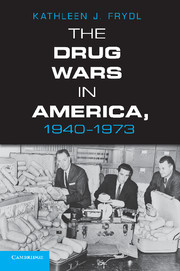Crossref Citations
This Book has been
cited by the following publications. This list is generated based on data provided by Crossref.
Thorpe, Rebecca U.
2015.
Perverse Politics: The Persistence of Mass Imprisonment in the Twenty-first Century.
Perspectives on Politics,
Vol. 13,
Issue. 3,
p.
618.
Davis, Joshua Clark
2015.
The business of getting high: head shops, countercultural capitalism, and the marijuana legalization movement.
The Sixties,
Vol. 8,
Issue. 1,
p.
27.
Sevigny, Eric L.
and
Fuleihan, Brian
2015.
The Handbook of Drugs and Society.
p.
258.
Pembleton, Matthew R.
2015.
The Voice of the Bureau: How Frederic Sondern and the Bureau of Narcotics Crafted a Drug War and Shaped Popular Understanding of Drugs, Addiction, and Organized Crime in the 1950s.
The Journal of American Culture,
Vol. 38,
Issue. 2,
p.
113.
Gallaher, Carolyn
2016.
Mexico, the failed state debate, and the Mérida fix.
The Geographical Journal,
Vol. 182,
Issue. 4,
p.
331.
Reinarman, Craig
2016.
Going Dutch.
Criminology & Public Policy,
Vol. 15,
Issue. 3,
p.
885.
Hagopian, Kevin
2016.
TomatoBaretta: Mediating Prime-Time White Ethnicity in the Post–Civil Rights Era.
Italian American Review,
Vol. 6,
Issue. 2,
p.
229.
Radil, Steven M.
Dezzani, Raymond J.
and
McAden, Lanny D.
2017.
Geographies of U.S. Police Militarization and the Role of the 1033 Program.
The Professional Geographer,
Vol. 69,
Issue. 2,
p.
203.
Rasmussen, Nicolas
2017.
Controlling “America’s Opium”: Barbiturate Abuse, Pharmaceutical Regulation, and the Politics of Public Health in the Early Postwar United States.
Journal of Policy History,
Vol. 29,
Issue. 4,
p.
543.
Nachlis, Herschel
2018.
Pockets of Weakness in Strong Institutions: Post-Marketing Regulation, Psychopharmaceutical Drugs, and Medical Autonomy, 1938–1982.
Studies in American Political Development,
Vol. 32,
Issue. 2,
p.
257.
Daudelin, Jean
and
Ratton, José Luiz
2018.
Illegal Markets, Violence, and Inequality.
p.
37.
Chouvy, Pierre-Arnaud
2019.
Territorial control and the scope and resilience of cannabis and other illegal drug crop cultivation.
EchoGéo,
Vol. 48,
Issue. ,
Daudelin, Jean
and
Jones, Philip
2019.
Canada–US Relations.
p.
217.
Kennedy, Liam
and
Coelho, Madelaine
2020.
“Absolutely the worst drug I’ve ever seen”: Risk, governance, and the construction of the illicit fentanyl “crisis”.
Theoretical Criminology,
Vol. 24,
Issue. 4,
p.
612.
Aaronson, Ely
2020.
Transnational Legal Ordering of Criminal Justice.
p.
176.
Unterman, Katherine
2020.
A Companion to U.S. Foreign Relations.
p.
528.
Merleaux, April
2020.
A Companion to U.S. Foreign Relations.
p.
572.
Pasetti, Matteo
2020.
Droghe e tossicodipendenze nella storia d'Italia.
ITALIA CONTEMPORANEA,
p.
163.
Siegel, Benjamin
2020.
Beneficent destinations: Global pharmaceuticals and the consolidation of the modern Indian opium regime, 1907–2002.
The Indian Economic & Social History Review,
Vol. 57,
Issue. 3,
p.
327.
Gillies, Allan
2020.
Contesting the ‘War on Drugs’ in the Andes: US–Bolivian Relations of Power and Control (1989–93).
Journal of Latin American Studies,
Vol. 52,
Issue. 1,
p.
77.



